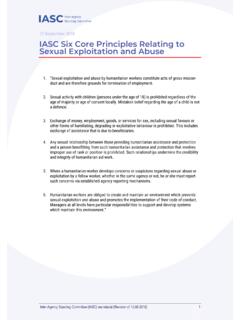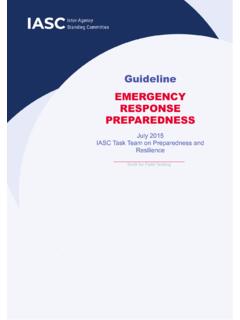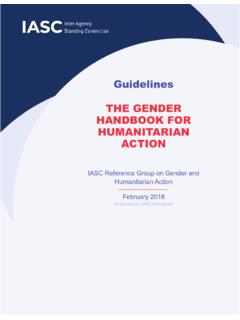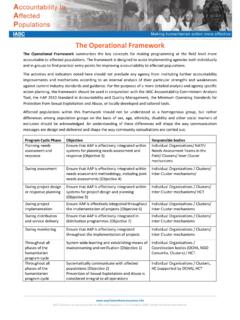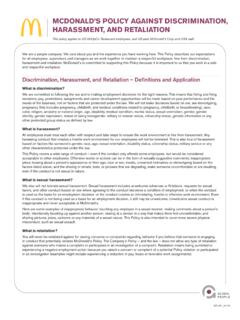Transcription of Inter-Agency Misconduct Disclosure Scheme Inter-Agency ...
1 Inter-Agency Misconduct Disclosure Scheme Inter-Agency Misconduct Disclosure Scheme Inter-Agency Scheme for the Disclosure of Safeguarding-related Misconduct in Recruitment Processes within the Humanitarian and Development Sector Preamble The purpose of this Scheme is to establish a minimum standard for humanitarian, development and other civil society organisations to share information as part of their recruitment process about people who have been found to have committed sexual harassment , sexual abuse or sexual exploitation during employment. It complements the work that organisations are already doing as part of their recruitment processes. This Scheme ensures that all organisations who sign up to it work to a common minimum exchange of relevant sensitive information, while respecting applicable legal and regulatory requirements. By so doing it contributes to organisations' work to prevent and address the consequences of sexual harassment and sexual exploitation and abuse in the humanitarian and development sector.
2 Organisations committed to this Scheme hope that it can be a good start and the basis from which to explore further collaborative approaches 1. Inter-Agency Misconduct Disclosure Scheme Inter-Agency Misconduct Disclosure Scheme Inter-Agency Scheme for the Disclosure of Safeguarding-related Misconduct in Recruitment Processes within the Humanitarian and Development Sector 1. Introduction This Scheme has been developed by a group of humanitarian, development and other civil society organisations to describe their commitment to share relevant information about individuals who have been found to have committed sexual harassment , sexual exploitation or sexual abuse in the course of their employment or terms of their position. This Scheme is premised on the belief that sharing relevant information in the recruitment process will allow employers to be more confident that individuals they recruit are fit to participate in development and humanitarian activities and/or other relevant activities, which will help mitigate the pressing safeguarding concerns within the sector.
3 This Scheme is intended to be consistent with and support implementation of the Core Humanitarian Standard on Quality and Accountability (CHS). For further information on the development of this Scheme or interpretation of its provisions please see the Explanatory Notes. 2. Purpose The safeguarding and related obligations of humanitarian, development and civil society organisations require them, individually and collectively, to take appropriate measures to prevent harm from occurring to the people that these organisations interact with and those who work for these organisations. These obligations require organisations to apply high standards in their recruitment process, which requires that they have access to reliable information to be able to form an accurate picture of whether a candidate may pose a safeguarding risk to their beneficiaries, staff and those of partner organisations.
4 This Scheme enables organisations participating in the Scheme ( Participating Organisations ) to disclose and receive relevant information about individuals found to have committed Misconduct relating to sexual exploitation, sexual abuse or sexual harassment , in order to make informed recruitment decisions. Participating Organisations will implement this Scheme to the full extent possible having regard to applicable legal and regulatory requirements. Participating Organisations will be transparent about any difficulties they encounter in applying this Scheme . 3. Definitions When used in this document: Authorised Personnel refers to the individual(s) within the Participating Organisation who is/are authorised to access a Candidate's Misconduct History, and who are responsible for managing and processing Statements of Conduct. Candidate refers to an individual who works, or has worked, for a Participating Organisation as an employee, or in a governing position ( as a member of a Participating Organisation's 2.)
5 Inter-Agency Misconduct Disclosure Scheme corporate bodies, such as Trustee / Board Director, etc. unless prohibited by the Participating Organisation's constitutional documents). Disciplinary Measure means the sanction applied by a Participating Organisation to a Candidate who is found to have committed a Misconduct as a result of an investigation Process, or the sanction that would have been applied in circumstances where an investigation Process concluded with a finding of Misconduct after the Candidate has left the Participating Organisation. Typical Disciplinary Measures include warning, suspension or termination. investigation Process for the purposes of this Scheme refers to each Participating Organisation's internal investigation process, including any subsequent disciplinary process, to determine whether a Candidate has committed Misconduct . Misconduct for the purposes of this Scheme covers sexual exploitation, sexual abuse and sexual harassment , as defined by each Participating Organisation.
6 As part of a Statement of Conduct, Participating Organisations shall make clear how they define these three terms, or whether they adopt the United Nations definitions of these Misconduct History means the following information relating to a Candidate held by a Participating Organisation: the type of Disciplinary Measure imposed for Misconduct ;. the type of Misconduct for which the Disciplinary Measure was imposed (sexual exploitation, sexual abuse or sexual harassment ); and the date of the Disciplinary Measure. Participating Organisations refers to organisations participating in this Scheme (see Appendix 2). Recruitment Process means the process by which Participating Organisations assess the suitability of a Candidate for a position, to decide whether to hire the Candidate. Requesting Organisation means the Participating Organisation requesting a Statement of Conduct about a Candidate.
7 Responding Organisation means the Participating Organisation providing a Statement of Conduct about a Candidate. Statement of Conduct means a statement from the Responding Organization substantially in the form and substance set out in Appendix 1, or a version of this form tailored by a Participating Organisation but which as a minimum contains substantially the same information. 4. Scope This Scheme sets out the principles and processes according to which Participating Organisations will share a Candidate's Statement of Conduct as part of the Recruitment Process. This Scheme is complementary to and separate from any other forms of due diligence that Participating Organisations may carry out as part of the Recruitment Process for the purposes of assessing a Candidate's suitability for a position, such as provision of references and background 1 Sexual harassment is defined in the UNSG's bulletin ST/SGB/2008/5 Sexual exploitation and abuse is defined in the 5 Oct 2016 UN Glossary on Sexual Exploitation and Abuse.
8 3. Inter-Agency Misconduct Disclosure Scheme checks or other vetting and screening mechanisms. In this context, it is within the discretion of each Participating Organisation to request or provide further information than the minimum required within the Statement of Conduct. The Scheme is also complementary to and separate from other forms of information sharing which may or may not be part of the Recruitment Process, for instance providing certificates of employment, updates to employee record books, and confirmations of employment for administrative purposes, to the extent that these do not conflict with the Scheme . This Scheme does not apply to vetting and screening measures concerning consultants, as the contractual processes for engaging consultants are different from those that apply to employees or those in governing positions. Participating Organisations endeavour to work together to achieve appropriate information sharing for consultants, so as to appropriately mitigate safeguarding- related risks.
9 5. Common Principles Participating Organisations agree that they will cooperate in the context of the Recruitment Process in accordance with the following common principles: Each Participating Organisation will ensure that the provision of, and the request for, a Statement of Conduct is a mandatory part of the Recruitment Process. Each Participating Organisation will ensure that Statements of Conduct are only provided by Authorised Personnel within the Participating Organisation. Participating Organisations will endeavour to ensure that: Allegations of Misconduct are followed up and acted upon appropriately, including through conducting and concluding a robust, fair and reliable investigation Process, even if the subject's employment or position ends before the commencement or conclusion of the investigation Process. Disciplinary Measures are appropriate to the Misconduct and documented so as to ensure that a Candidate's Misconduct History is accurate and reliable.
10 A Candidate's Misconduct History is processed internally by Participating Organisations in accordance with applicable data protection legislation, regulations and internal policies. Participating Organisations will ensure that a Candidate's Misconduct History is accessible to the Candidate at all times and to Authorised Personnel, and that appropriate measures are taken to protect a Candidate's Misconduct History from deletion, alteration and unauthorised access. If a Participating Organisation in a particular case is not able to request or provide the information contemplated with the Statement of Conduct for reasons owing to compliance with applicable legal and regulatory requirements, or an investigation , inquiry, or decision from a competent authority or judicial body, the Participating Organisation should be transparent about the reasons for this, including by documenting these reasons within the Statement of Conduct.


